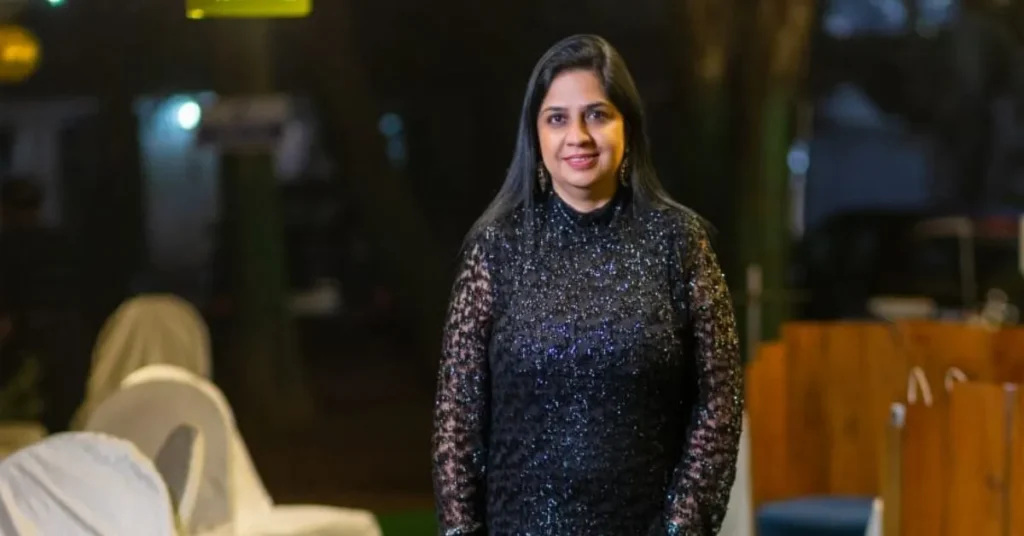Anuradha, a passionate storyteller and devoted romantic, embarked on an unexpected writing journey fueled by life’s twists and personal resilience. From her Bollywood-inspired dreams to becoming a bestselling author, she shares her heartfelt experiences, unwavering dedication, and insights into the evolving landscape of writing in India.
RIA: How was your childhood as a girl?
AK: My childhood was beautiful. I was the first girl born in my family in 150 years. With no sisters for my father or grandfather and four brothers for me, I was pampered. My grandmother, who had six daughters, was surprised by my birth. My grandfather even threw a cocktail party in my honor. My family had chosen my name, Anuradha, before I was born because they were so excited. I was cherished greatly. When I got married, my uncle told my husband, “You are taking my lifeline with you.” My husband reassured him, saying, “Don’t worry, she will be my lifeline now.” I have been pampered both before and after marriage. My childhood was truly beautiful.
RIA: Marriage can feel like a nightmare for many. How do you view marriage, and how has it positively changed your life?
AK: I am very much in favor of marriage. I think everyone should experience it. This “laddu” is indeed very sweet. I have been married for 27 years and have a very supportive husband. I got married at 21 and had my son at 23, so I was quite immature back then. I didn’t even realize I was supposed to sit with the elders as the bahu of the family; I felt more comfortable sitting with the children. Over time, I matured and grew up. Now, I have spent more years with my in-laws than with my own family. Marriage has been a beautiful journey for me.
RIA: Given that you married so early, do you feel you could have achieved more if you hadn’t? Any regrets?
AK: No, I don’t think so. I believe I was meant to marry at 21. From my teenage years, I dreamed of getting married one day—I am very filmy, very Bollywood-like. I wanted someone to sweep me off my feet. Ours was an arranged marriage through a newspaper ad. I’m from Agra, and my husband is from Kolkata. We met twice before getting engaged for 8 and a half months, and then we got married. I moved from a nuclear family to a large joint family, which was quite different. However, back then, girls knew how to adjust well. I had no complaints and didn’t even know how to complain because I was having so much fun. Nowadays, parents often tell their children to come home if they have problems, but we didn’t have that option, and we didn’t even think about it. We were too busy enjoying ourselves. So, I have had a wonderful, merry-go-round kind of marriage with its ups and downs, but that’s just part of the journey.
RIA: How did you start your writing journey?
AK: As I mentioned, I married into a large joint family. My in-laws were elderly, and my husband is the fourth child. I spent a lot of time taking care of the family. When my son was born at 23, I was very busy managing everything. My husband, a photographer and cinematographer with a studio at home, would often find me crying. He’d ask what was wrong, and I would say, “What if I die tomorrow and nobody knows me?” He encouraged me to do something meaningful with my life and make a name for myself. When my son was in school, I helped him with debates and elocutions at school. One day, a friend from my school WhatsApp group mentioned a Times of India competition involving writing short paragraphs that built into a story. She asked who would participate, and I, never one to say no, decided to give it a try. Although I didn’t win, it was the start of my writing journey. That first short story was the beginning. The competition continued to provide prompts, and I kept writing stories. That’s how it all began for me.

RIA: Can you share with us about your first story?
AK: My first story, “The Revenge,” was based on a true story I knew. A man sexually molested his daughter, which deeply affected me. In real life, the wife accepted him, but in my story, I took a different route and introduced a twist where the man is murdered. My writing journey began unexpectedly.
RIA: How has your reading habit been since childhood?
AK: I have always loved reading. I had about 1500 Amar Chitra Kathas and devoured Enid Blyton’s books. My favorite genre was Mills and Boon because I’m a die-hard romantic and Bollywood fan. I used to finish a Mills and Boon novel in about an hour every afternoon. My father encouraged me to join a library in Agra, saying we couldn’t afford to buy books every day. Even as a small child, I loved weaving stories, unknowingly practicing the art of storytelling from a very early age.
RIA: Can you tell us about your schooling and college days, and what subjects you pursued?
AK: I attended Jesus and Mary Convent in Agra, specifically St. Anthony’s High School, where I was an average student. For college, I stayed in Agra and attended St. John’s College, a heritage property. After college, I completed a small computer science course and worked in that field for a year before getting engaged. Since I always dreamed of getting married, I left my job to focus on preparing for my wedding.
Also Read: Aditi Bhattacharya: Redefine Style and Sustainability
RIA: How is your bonding with your son?
AK: My son now works in Bollywood for Anupama Chopra’s YouTube channel, Film Companion. He shares my passion for Bollywood, and we are very alike. His friends say I’m the coolest mom ever because I see everything through a filmy lens. I believe he’s inherited that trait from me.
RIA: How do you view the current writing scenario in India?
AK: It’s quite sad. In school, we focused heavily on grammar, editing, comprehensions, and essays, especially in a strict environment like Jesus and Mary Convent. Nowadays, that rigor seems to be missing because everything is available on Google. If you want to edit or type something, there’s ChatGPT. The writing scenario has changed for the worse. Today, authors, writers, and bloggers seem to be popping up everywhere, but that sense of class and quality isn’t there anymore.

RIA: Do you think that tools like ChatGPT are ruining the creativity of children, especially since they are using it extensively for their assignments? Is it hampering their ability to think?
AK: It’s true that the more students think and engage, the more they groom themselves, but they’re not doing that. AI is both a boon and a bane. While it allows us to move forward rapidly, it also causes regression. Kids lack knowledge about literature and creativity. Even parents, eager to quickly complete their children’s projects, often encourage the use of Google or AI. This trend is concerning because when AI or a parent does the assignment, the child isn’t learning anything.
RIA: As an author yourself, how do you navigate the current scenario? You need to publish your books too. How do you see this landscape, and what do you expect for the future?
AK: I don’t see things changing for the better, unfortunately. Everything is about money these days. I recently learned that even bestseller authors can be created through financial means. If you pay a certain amount, you can become a bestselling author. If the market has reached a point where creativity can be bought, I don’t think it will change because it has become too easy for people. While I would love to see things improve, I don’t believe they will.
RIA: How did it feel when you first published your book and began your journey as an author?
AK: My first book was relatively easy to publish because it was a compilation of short stories. The Times of India used to provide prompts, and I wrote for every one of them. Quickly, I had a collection of short stories that I compiled into a book and published as my first paperback. For my second book, titled “Leaps and Bounds,” it’s been a more challenging but rewarding journey. This non-fiction book features 24 short stories about inspiring women across India. Each story focuses on a moment when a woman takes a leap in life to follow her passion, much like I did when I turned 40 and started writing. It took me two years to complete because I wanted to give it my all.
RIA: And now, some quick rapid-fire questions:
- Who is your favorite author/s?
AK: Enid Blyton, Sudha Moorthy, and Akanksha Malhotra.
2. Which book has changed your perspective on life?
AK: Ikigai.
RIA: One thing that you’ve taken from Ikigai.
AK: Ikigai talks about doing what you love. Despite others’ opinions, pursue what brings you joy and fulfillment.
RIA: Did you find your Ikigai?
AK: Absolutely, I did. Many times. There have been moments when I felt certain paths were right for me, only to discover another path that felt equally right later on. I see myself as a perpetual student, still learning every day. Currently, I’m exploring scriptwriting, even at the age of 50. I believe my life has just begun, and the journey of learning new things daily is truly beautiful.
RIA: If given a chance and assured you would become a genuine bestseller, what kind of book would you choose to write?
AK: Right now, I’m very excited about writing a psychological thriller. I have an intriguing story in mind that I’m eager to pen down. If I were promised it would be a bestseller, I would definitely pursue it.
RIA: As someone experienced in writing and publishing books, what advice would you give to genuine aspiring authors who prefer not to use AI tools?
AK: Genuine aspiring authors should steer clear of AI tools; they should be banned. Instead, face writer’s block head-on by committing to writing at least a paragraph every day. This consistent effort keeps you motivated and focused on completing your book. Two years ago, when I decided to write my book, I publicly announced my intention and even created a poster on Facebook the next day. This declaration held me accountable and motivated me to finish what I started. Once you’ve announced your project, there’s no turning back. Consistency is key. I make sure to write every single day without fail. This discipline is crucial for anyone, especially those juggling writing with other responsibilities. Maintaining this daily practice ensures that momentum stays strong. So, that’s my advice to everyone aspiring to write: stay committed, write daily, and avoid shortcuts that can hinder your creative process.



